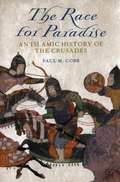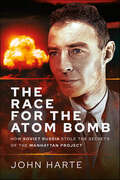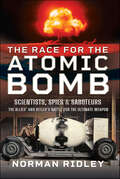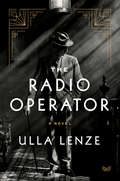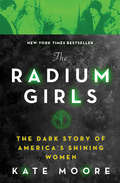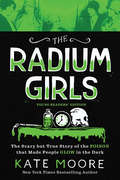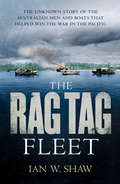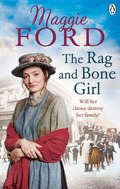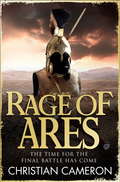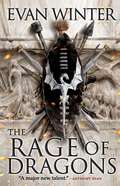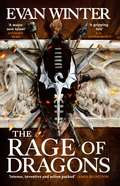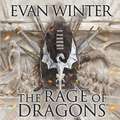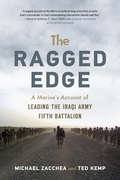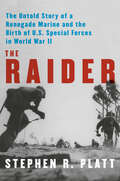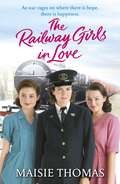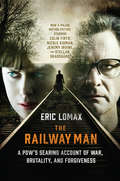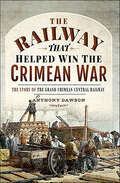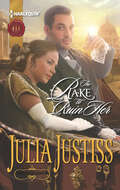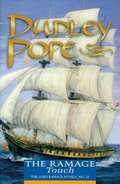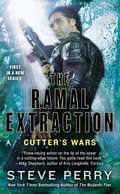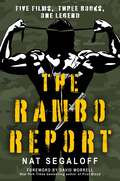- Table View
- List View
The Race for Paradise: An Islamic History of the Crusades
by Paul M. CobbIn The Race for Paradise, Paul M. Cobb offers a new history of the confrontations between Muslims and Franks we now call the "Crusades," one that emphasizes the diversity of Muslim experiences of the European holy war. There is more to the story than Jerusalem, the Templars, Saladin, and the Assassins. Cobb considers the Arab perspective on all shores of the Muslim Mediterranean, from Spain to Syria. In the process, he shows that this is not a straightforward story of warriors and kings clashing in the Holy Land, but a more complicated tale of border-crossers and turncoats; of embassies and merchants; of scholars and spies, all of them seeking to manage a new threat from the barbarian fringes of their ordered world. When seen from the perspective of medieval Muslims, the Crusades emerge as something altogether different from the high-flying rhetoric of the European chronicles: as a cultural encounter to ponder, a diplomatic chess-game to be mastered, a commercial opportunity to be seized, and as so often happened, a political challenge to be exploited by ambitious rulers making canny use of the language of jihad.
The Race for the Atom Bomb: How Soviet Russia Stole the Secrets of the Manhattan Project
by John HarteDescribes how Soviet Russia’s leading spymasters in Moscow Center obtained information from British and American physicists to make an atomic bomb. When Nazi Germany began a secret weapons program called “The Uranium Club” in April 1939, Stalin was alerted by his American and British spies of the possibility that German scientists were working to develop an atomic bomb. The British Government and the United States, and Stalin, realized that if Hitler used The Atom Bomb, it could mean the end of the West or the end of the world. John Harte’s new book about The Manhattan Project describes how Soviet Russia’s leading spymasters in Moscow Center obtained information from British and American physicists to make a Soviet atomic bomb at each and every stage when the American bomb was developed at Los Alamos in New Mexico.
The Race for the Atomic Bomb: Scientists, Spies & Saboteurs—The Allies' and Hitler's Battle for the Ultimate Weapon
by Norman RidleyOn 19 December 1938, Otto Hahn, working at the Kaiser Wilhelm Institute for Chemistry in Berlin, conducted an experiment the results of which baffled him. It took his émigré collaborator Lise Meitner to explain that he had split an atom of uranium, which at the time seemed to defy all known laws of physics. When Neils Bohr took this news to the United States it became clear to scientists there that these results opened a completely new and, for some, horrifying possibility of energy production that could be used for both peaceful and military purposes. Scientists in Germany, France, Britain and the US began to delve deeper into the implications. But it was the British government that was the first to explicitly describe how the splitting of the atom might be utilized to create a practical weapon of fearsome power. France, by then, had been occupied by the Germans and most of their nuclear scientists had fled to Britain. For their part, the Germans, who for a time were at the very forefront of nuclear research, had weakened their own scientific ranks by hounding many of their best scientists who had fled persecution under the draconian Nazi racial laws. They still retained, however, possibly the ablest nuclear scientist of them all in Werner Heisenberg who set about developing his own program for nuclear power. British scientists made extensive progress before realizing that translating their laboratory results into the vast industrial enterprise required to build a bomb was way beyond the nation’s stretched resources. The government agreed to hand over all the UK’s research findings to America in return for a share of the spoils. The United States, for its part, was impressed with British results and invested enormous sums of money and resources into what became known as the Manhattan Project in a concerted effort to build a bomb before the end of the war. For much of the war the Soviets showed little enthusiasm for the sort of investment required to build their own bomb. However, with an eye to the future they established an extensive espionage network both in Britain and America. Following the German surrender there was still the problem of Japan, and the race continued to develop a working bomb to accelerate the end of the war, both to save Allied lives and to prevent Soviet expansion into northern China and the Japanese mainland. It was a race that the Unites States won. It was also a race that ushered in a new Cold War.
The Radio Operator: A Novel
by Ulla LenzeBased on a true story, a gripping historical novel about a German immigrant who becomes embroiled in a Nazi spy ring operating in New York City in the early days of World War II.At the end of the 1930s, Europe is engulfed in war. Though America is far from the fighting, the streets of New York have become a battlefield. Anti-Semitic and racist groups spread hate, while German nationalists celebrate Hitler’s strength and power. Josef Klein, a German immigrant, remains immune to the troubles roiling his adopted city. The multicultural neighborhood of Harlem is his world, a lively place full of sidewalk tables where families enjoy their dinner and friends indulge in games of chess. Josef’s great passion is the radio. His skill and technical abilities attract the attention of influential men who offer him a job as a shortwave operator. But when Josef begins to understand what they’re doing, it’s too late; he’s already a little cog in the big wheel—part of a Nazi espionage network working in Manhattan. Discovered by American authorities, Josef is detained at Ellis Island, and eventually deported to Germany.Back in his homeland, fate leads him to his brother Carl's family, soap merchants in Neuss—where he witnesses the seductive power of the Nazis and the war’s terrible consequences—and finally to South America, where Josef hopes to start over again as José. Eventually, Josef realizes that no matter how far he runs or how hard he tries, there is one indelible truth he cannot escape: How long can you hide from your own past, before it catches up with you?Copyright 2020 by Klett-Cotta-J.G. Cotta'sche Buchhandlung Nachfolger GmbH Stuttgart, Germany; Translated by Marshall Yarbrough
The Radium Girls: The Dark Story of America's Shining Women
by Kate MooreThe incredible true story of the women who fought America's Undark danger<P><P>The Curies' newly discovered element of radium makes gleaming headlines across the nation as the fresh face of beauty, and wonder drug of the medical community. From body lotion to tonic water, the popular new element shines bright in the otherwise dark years of the First World War. <P>Meanwhile, hundreds of girls toil amidst the glowing dust of the radium-dial factories. The glittering chemical covers their bodies from head to toe; they light up the night like industrious fireflies. With such a coveted job, these "shining girls" are the luckiest alive — until they begin to fall mysteriously ill.But the factories that once offered golden opportunities are now ignoring all claims of the gruesome side effects, and the women's cries of corruption. And as the fatal poison of the radium takes hold, the brave shining girls find themselves embroiled in one of the biggest scandals of America's early 20th century, and in a groundbreaking battle for workers' rights that will echo for centuries to come. W <P>ritten with a sparkling voice and breakneck pace, The Radium Girls fully illuminates the inspiring young women exposed to the "wonder" substance of radium, and their awe-inspiring strength in the face of almost impossible circumstances. <P>Their courage and tenacity led to life-changing regulations, research into nuclear bombing, and ultimately saved hundreds of thousands of lives...
The Radium Girls: The Scary but True Story of the Poison that Made People Glow in the Dark
by Kate MooreExplore the unbelievable true story of America's glowing girls and their fight for justice in the young readers edition of the New York Times and USA Today bestseller The Radium Girls. This enthralling new edition includes all-new material, including a glossary, timeline, and dozens of bonus photos.Amid the excitement of the early twentieth century, hundreds of young women spend their days hard at work painting watch dials with glow-in-the-dark radium paint. The painters consider themselves lucky—until they start suffering from a mysterious illness. As the corporations try to cover up a shocking secret, these shining girls suddenly find themselves at the center of a deadly scandal.The Radium Girls: Young Readers Edition tells the unbelievable true story of these incredible women, whose determination to fight back saved countless lives.This new edition of the national bestseller is perfect for:Educators looking for history books for kids ages 9 to 12, nonfiction books for kids, biographies for kids, and real stories around the industrial revolution, chemistry, and scienceParents, educators, and librarians looking for stories about strong women, inspiring books for girls, childrens books about women in history, and famous women books for girlsYoung readers who want to read one of the most inspiring and shocking narratives of the early 20th century
The Rag Tag Fleet: The unknown story of the Australian men and boats that helped win the war in the Pacific
by Ian W. ShawThe fascinating - and unknown - story of the Rag Tag Fleet, a collection of hundreds of Australian fishing trawlers and schooners, organised by the US Army, which transported vital supplies for US and Australian forces across the South-East Pacific.Boys under the age of 17 and men over 60, and those who weren't well enough to join the Australian regular forces formed the crews. Each boat was armed with one machine gun - and sailed under the American flag.Conditions on the boats were grim. Numerous crew members contracted diseases including malaria, dysentery and dengue fever. Vulnerable to aircraft attack, the boats were frequently strafed and bombed.The story is told through the experiences of the Australian crew on half a dozen ships - including Jack Savage, boat builder extraordinaire; Ray Parer, air fighter, explorer and gold miner; and Norm Oddy, bandleader, drifter and mechanic.The focus of THE RAG TAG FLEET is the unknown story of the final months of 1942, when these men ran the gauntlet of Japanese air attacks, reefs and shallow, shark-infested waters to bring in the supplies and equipment for the US and Australian troops that defeated the entrenched Japanese forces at Buna on the PNG coast, and so helped turn the course of the war.
The Rag and Bone Girl
by Maggie FordWhat will she sacrifice for love? Growing up in London’s East End with six siblings, Nora Taylor has always been close to her younger sister Maggie. But when she meets Maggie’s fiancé Robert, they are immediately drawn to each other. Forced to choose between her family and her heart, Nora decides to marry the man she loves – even if it means losing her sister.When the First World War breaks out, Nora must fight to hold her family together through the challenges and tragedies to come. As her children grow up they embark on their own adventures, but another war will threaten all their hopes for the future. Can this broken family survive the dark days of wartime?A sweeping saga charting one family’s fortunes through the First and Second World War and beyond, perfect for fans of Maggie Hope and Dilly Court.
The Rage of Ares
by Christian CameronArimnestos of Plataea was one of the heroes of the Battle of Marathon, in which the heroic Greeks halted the invading Persians in their tracks, and fought in the equally celebrated naval battle at Salamis. But even these stunning victories only served to buy the Greeks time, as the Persians gathered a new army, returning with overwhelming force to strike the final killing blow. For the Greeks, divided and outnumbered, there was only one possible strategy: attack. And so, in the blazing summer of 479 BC, Arimnestos took up his spear one final time at the Battle of Plataea.
The Rage of Dragons (The Burning #1)
by Evan WinterGame of Thrones meets Gladiator in this debut epic fantasy about a world caught in an eternal war, and the young man who will become his people's only hope for survival. <P><P>The Omehi people have been fighting an unwinnable fight for almost two hundred years. Their society has been built around war and only war. The lucky ones are born gifted. One in every two thousand women has the power to call down dragons. One in every hundred men is able to magically transform himself into a bigger, stronger, faster killing machine. <P><P>Everyone else is fodder, destined to fight and die in the endless war. <P><P>Young, gift-less Tau knows all this, but he has a plan of escape. He's going to get himself injured, get out early, and settle down to marriage, children, and land. Only, he doesn't get the chance. Those closest to him are brutally murdered, and his grief swiftly turns to anger. Fixated on revenge, Tau dedicates himself to an unthinkable path. He'll become the greatest swordsman to ever live, a man willing to die a hundred thousand times for the chance to kill the three who betrayed him. <P><P>The Rage of Dragons launches a stunning and powerful debut epic fantasy series that readers are already calling "the best fantasy book in years.
The Rage of Dragons: The Burning, Book One (The Burning #1)
by Evan Winter'A captivating epic fantasy from a major new talent' Anthony Ryan, author of Blood Song***ONE OF TIME MAGAZINE'S 100 BEST FANTASY BOOKS OF ALL TIME*** IN A WORLD CONSUMED BY ENDLESS WAR ONE YOUNG MAN WILL BECOME HIS PEOPLE'S ONLY HOPE FOR SURVIVAL.The Omehi people have been fighting an unwinnable war for generations. The lucky ones are born gifted: some have the power to call down dragons, others can be magically transformed into bigger, stronger, faster killing machines. Everyone else is fodder, destined to fight and die in the endless war. Tau Tafari wants more than this, but his plans of escape are destroyed when those closest to him are brutally murdered.With too few gifted left, the Omehi are facing genocide, but Tau cares only for revenge. Following an unthinkable path, he will strive to become the greatest swordsman to ever live, willing to die a hundred thousand times for the chance to kill three of his own people.THE RAGE OF DRAGONS LAUNCHES AN UNMISSABLE EPIC FANTASY SERIES. 'Intense, inventive and action-packed from beginning to end - a relentlessly gripping, brilliant read' James Islington, author of The Shadow of What Was Lost'Stunning debut fantasy' Publishers Weekly'Intense, vivid and brilliantly realised - a necessary read' Anna Smith Spark, author of The Court of Broken Knives'Fans of Anthony Ryan's Blood Song will love this' Django Wexler, author of The Thousand Names'A Xhosa-inspired world complete with magic, dragons, demons and curses, The Rage of Dragons takes classic fantasy and imbues it with a fresh and exciting twist' Anna Stephens, author of Godblind
The Rage of Dragons: The Burning, Book One (The Burning #1)
by Evan Winter'A captivating epic fantasy from a major new talent' Anthony Ryan, author of Blood Song'Intense, inventive and action-packed from beginning to end - a relentlessly gripping, brilliant read' James Islington, author of The Shadow of What Was LostThe Omehi people have been fighting an unwinnable war for generations. The lucky ones are born gifted: some have the power to call down dragons, others can be magically transformed into bigger, stronger, faster killing machines. Everyone else is fodder, destined to fight and die in the endless war. Tau Tafari wants more than this, but his plans of escape are destroyed when those closest to him are brutally murdered.With too few gifted left the Omehi are facing genocide, but Tau cares only for revenge. Following an unthinkable path, he will strive to become the greatest swordsman to ever live, willing to die a hundred thousand times for the chance to kill three of his own people.THE RAGE OF DRAGONS LAUNCHES AN UNMISSABLE EPIC FANTASY SERIES ABOUT A WORLD CAUGHT IN AN ENDLESS WAR AND THE YOUNG MAN WHO WILL BECOME HIS PEOPLE'S ONLY HOPE FOR SURVIVAL'Utter and complete perfection. Winter has created an absolute masterpiece of a novel' The Bookbag'Intense, vivid and brilliantly realized - a necessary read' Anna Smith Spark, author of The Court of Broken Knives'Stunning debut fantasy' Publishers Weekly'Fans of Anthony Ryan's Blood Song will love this' Django Wexler, author of The Thousand Names'A Xhosa-inspired world complete with magic, dragons, demons and curses, The Rage of Dragons takes classic fantasy and imbues it with a fresh and exciting twist' Anna Stephens, author of Godblind'A gripping tale . . . with one of the most enthralling hero's journeys I've read' S. A. Chakraborty, author of City of Brass
The Ragged Edge: A US Marine's Account of Leading the Iraqi Army Fifth Battalion
by Michael Zacchea Paul D. Eaton Ted KempDeployed to Iraq in March 2004 after the overthrow of Saddam Hussein, US Marine Michael Zacchea thought he had landed a plum assignment. His team's mission was to build, train, and lead in combat the first Iraqi Army battalion trained by the US military.Quickly, he realized he was faced with a nearly impossible task. With just two weeks' training based on outdated and irrelevant materials, no language instruction, and few cultural tips for interacting with his battalion of Shiites, Sunnis, Kurds, Yazidis, and others, Zacchea arrived at his base in Kirkush to learn his recruits would need beds, boots, uniforms, and equipment. His Iraqi officer counterparts spoke little English. He had little time to transform his troops—mostly poor, uneducated farmers—into a cohesive rifle battalion that would fight a new insurgency erupting across Iraq.In order to stand up a fighting battalion, Zacchea knew, he would have to understand his men. Unlike other combat Marines in Iraq at the time, he immersed himself in Iraq's culture: learning its languages, eating its foods, observing its traditions—even being inducted into one of its Sunni tribes. A constant source of both pride and frustration, the Iraqi Army Fifth Battalion went on to fight bravely at the Battle of Fallujah against the forces that would eventually form ISIS.The Ragged Edge is Zacchea's deeply personal and powerful account of hopeful determination, of brotherhood and betrayal, and of cultural ignorance and misunderstanding. It sheds light on the dangerous pitfalls of training foreign troops to fight murderous insurgents and terrorists, precisely when such wartime collaboration is happening more than at any other time in US history.
The Ragged Ones
by Burke Davisthis is the true story of sixty days of guerrilla warfare during the Southern Campaign of the American Revolution, and the men and women caught up in the terror of that bitter civil war. This neglected and almost forgotten campaign, a desperate retreat toward ultimate victory, bled the British invaders and helped to make American independence inevitable. The story is drawn from military records, letters and diaries, and many now-obscure accounts of the first war of the United States. Though I am aware that this grim story may offend many organized descendants of the soldiers of the Revolution, I must observe that historical fact has been altered only in minor detail.
The Raider: The Untold Story of a Renegade Marine and the Birth of U.S. Special Forces in World War II
by Stephen R. PlattThe extraordinary life of forgotten World War II hero Evans Carlson, commander of America&’s first special forces, secret confidant of FDR, and one of the most controversial officers in the history of the Marine Corps, who dedicated his life to bridging the cultural divide between the United States and China&“He was a gutsy old man.&” &“A corker,&” said another. &“You couldn&’t find anyone better.&” They talked about him in hushed tones. &“This Major Carlson,&” wrote one of the officers in a letter home, &“is one of the finest men I have ever known.&”These were the words of the young Marines training to be among the first U.S. troops to enter the Second World War—and the Major Carlson they spoke of was Evans Carlson, a man of mythical status even before the war that would make him a military legend.By December of 1941, at the age of forty-five, Carlson had already faced off against Sandinistas in the jungles of Nicaragua and served multiple tours in China, where he embedded with Mao&’s Communist forces during the Sino-Japanese War. Inspired by their guerilla tactics and their collaborative spirit—which he&’d call &“gung ho,&” introducing the term to the English language—and driven by his own Emersonian ideals of self-reliance, Carlson would go on to form his renowned Marine Raiders, the progenitors of today&’s special operations forces, who fought behind Japanese lines on Makin Island and Guadalcanal, showing Americans a new way to do battle.In The Raider, Cundill Prize–winning historian Stephen R. Platt gives us the first authoritative account of Carlson&’s larger-than-life exploits: the real story, based on years of research including newly discovered diaries and correspondence in English and Chinese, with deep insight into the conflicted idealism about the Chinese Communists that would prove Carlson&’s undoing in the McCarthy era.Tracing the rise and fall of an unlikely American war hero, The Raider is a story of exploration, of cultural (mis)understanding, and of one man&’s awakening to the sheer breadth of the world.
The Railway Girls in Love (The railway girls series #3)
by Maisie ThomasThe brand new Railway Girls novel set in Manchester during WWII. Perfect for fans of Nancy Revell, Daisy Styles and Margaret Dickinson.___________________Readers LOVE the Railway Girls: 'Gripping and intriguing''Great story lines''Exceptional story . . . a must-read' 'Poignant''Emotional . . . strong women' ___________________Love is in the air, and together the railway girls can overcome even the hardest of times.Mabel has finally put the past behind her, and her relationship with the dashing Harry is stronger than ever. That is, until an old flame shows up, leaving Mabel questioning her future.Meanwhile Joan has made amends with Bob - if only she could do the same with Gran. And there's still that family mystery she wants answer to, isn't there?As a mother and grandmother, Dot Green has always put her family first. Her job as a parcels porter has brought new purpose to her life, so is it finally time to start following her heart . . .Life as a railway girl is busy but as war rages on and air raids disrupt daily life, the women realise they need each other more than ever, especially when there might be wedding bells on the horizon.
The Railway Girls: Their bond will see them through (The railway girls series #1)
by Maisie ThomasThe first novel in the wonderful new Railway Girls series, perfect for fans of Nancy Revell and Ellie Dean._____________________ 'Stunning writing [and] perfectly paced' Frost Magazine'A story of true friendship, love, loss and trust' Candis _____________________In February, 1922, at the western-most entrance to Victoria Station in Manchester, a massive plaque was unveiled. Beneath a vast tiled map showing the lines of the Lancashire and Yorkshire Railway network, a series of seven bronze panels recorded the names of the men of the Lancashire and Yorkshire Railway who gave their lives for King and Country in the Great War - a total of 1,460 names.In March, 1940, a group of women of varying ages and backgrounds, stand in front of the memorial, ready to do their bit in this new World War..._____________________Mabel is determined to make a fresh start as a railway girl where no one will know the terrible thing she did and she can put her guilt behind her... Or is she just running away?Meanwhile Joan will never be as good as her sister, or so her Gran keeps telling her. A new job as a station clerk could be just the thing she needs to forget her troubles at home.And Dot is further into her forties than she cares to admit. Her beloved sons are away fighting and her husband - well, the less said about him the better. Ratty old sod. She is anxious to become a railway girl just like her dear mam - anything to feel she is supporting the sons she prays for every night.The three women start off as strangers, but soon form an unbreakable bond that will get them through the toughest of times..._____________________ **Maisie's brand new novel THE RAILWAY GIRLS IN LOVE is available to pre-order now. Just search: 9781787463981**
The Railway Man: A POW's Searing Account of War, Brutality and Forgiveness
by Eric LomaxNow a Major Motion Picture Starring Colin Firth and Nicole Kidman. The Railway Man is a remarkable memoir of forgiveness--a tremendous testament to the courage that propels one toward remembrance, and finally, peace with the past. Eric Lomax, sent to Malaya in World War II, was taken prisoner by the Japanese and put to punishing work on the notorious Burma-Siam railway. After the radio he illicitly helped to build in order to follow war news was discovered, he was subjected to two years of starvation and torture. He would never forget the interpreter at these brutal sessions. Fifty years after returning home from the war, marrying, and gaining the strength from his wife Patti to fight his demons, he learned the interpreter was alive. Through letters and meeting with his former torturer, Lomax bravely moved beyond bitterness drawing on an extraordinary will to extend forgiveness.
The Railway that Helped Win the Crimean War: The Story of the Grand Crimean Central Railway
by Anthony DawsonWeek after week, the guns of the British expeditionary force battered away at the defences of Sevastopol, eight miles away from Balaklava, the port through which all besiegers’ supplies arrived. As autumn turned to winter, rain and frost turned the track from Balaklava into a muddy quagmire and soon it became virtually impassable. Horses were dying daily in their endeavours to pull carts up the hills to the siege lines, and with few supplies reaching the front, the troops suffered terribly from malnutrition and frostbite. Unless a solution could be found, the entire operation was doomed to humiliating, disastrous failure. When news of the terrible plight of the troops reached the UK, a leading railway contractor and his partners undertook to build a railway at cost from Balaklava to the front line – and promised that they could construct it in just three weeks after they arrived in the Crimea. Though it took almost seven weeks to complete the railway, in that time a double track which rose 500 feet from the port and travelled for seven miles to the siege lines had been laid. With food, clothing and ammunition at last able to reach the front, the British along with their French allies were able to capture Sevastopol and bring the Crimean War to an end. In this comprehensive and detailed account of the construction and use of what became known as the Grand Crimean Central Railway the author describes the astonishing achievement in building the first railway ever employed in warfare, and the first to be used for casualty evacuation, thousands of miles from the UK.
The Rake to Ruin Her (Ransleigh Rogues #1)
by Julia Justiss“So wonderfully different from the usual spinster trope . . . the divine prose is simply swoon worthy . . . A magnificent debut to a new series!” —Fresh Fiction (Fresh Pick)Once a rake . . . Known as “Magnificent Max,” diplomat Max Ransleigh was famed for his lethal charm until a political betrayal left him exiled from government and his reputation in tatters. He seems a very unlikely savior for a well-bred young lady.Except that Miss Caroline Denby doesn’t want to be saved . . . she wants to be ruined! To Caroline, getting married is tantamount to a death sentence, and meeting the rakish Max at a house party seems the answer to her prayers. Surely this rogue won’t hesitate to put his bad reputation to good use?“Outrageous and refreshingly inventive, with a lady in distress, an available rogue, and a marriage of convenience for all. Justiss encapsulates the period, language and mores of the Regency era with great skill.” —Romantic Times (4 stars)
The Ramage Touch
by Dudley PopePost Captain Ramage is prowling the Tuscan coast and far from English aid when he encounters a daunting French invasion fleet. As the enemy gathers strength, Ramage must decide how to thwart its actions with only the frigate Calypso and a pair of bomb ketches.
The Ramal Extraction
by Steve PerryAt the close of the 24th Century, a series of revolutions has caused the galaxy to descend into chaos. With the Galactic Union's Army stretched thin, mercenary units have arisen for those who have the need--and the means--to hire them... Captained by former Detached Guerrilla Forces Colonel R.A. "Rags" Cutter, the Cutter Force Initiative is one of the best. A specialized team consisting of both aliens and humans, the Cutters offer services ranging from fight training and protection to extraction and assassination--as long as the target deserves it and their employer makes good on payday. When they're hired to find and rescue Indira, the soon-to-be-married daughter of the Rajah Ramal of New Mumbai, the teams' first task is to identify the kidnapper. The obvious suspects are insurgents who want to overthrow the rajanate, but as other forces enter the game and an assassination attempt is made on Ramal, the Cutters realize that their in-and-out extraction job is about to get a lot more interesting--and a lot more lethal...
The Rambo Report: Five Films, Three Books, One Legend
by Nat SegaloffThe ultimate guide to the Rambo phenomenon—from bestselling novel to Hollywood blockbuster to all-American hero, legend, and icon—written with the full cooperation of Rambo&’s creator, bestselling author David Morrell . . . From the beginning, Rambo was more than a character in a 1972 novel by David Morrell. He was the culmination of the author&’s personal encounters with veterans returning from the Vietnam War. The 1982 movie adaptation of First Blood reflected the novel&’s powerful insights into a troubled veteran&’s postwar experience. Then in 1985, the film&’s explosive sequel Rambo: First Blood Part II transformed the character into something shockingly different. With a focus on blood-and-guts action—and the beefed-up muscles of Sylvester Stallone—Rambo became an invincible one-man army. A new kind of hero for a new day in America. A full-blown pop-culture icon as controversial as he was crowd-pleasing—blasting his way through the most influential action film franchise in Hollywood history . . . The Rambo legend was born. Five feature films. Three novels. Seven video games. Countless comic books, action figures, and even an animated TV show for kids. The Rambo machine has been as unstoppable as Rambo himself. Now for the first time, Hollywood insider Nat Segaloff digs deep into the man, the myth, and the massive impact of the phenomenon known as &“The Rambo Effect.&” Packed with behind-the-scenes anecdotes, sharp cultural insights, and ongoing debates about violence in the media, this is an explosive no-holds-barred report from the front lines of Hollywood mythmaking. A must-read for Rambo fans, movies buffs, and anyone interested in American culture . . .
The Rancher Returns: A Passionate Enemies-to-Lovers Western Romance (The Westmoreland Legacy #1)
by Brenda JacksonDiscover New York Times bestselling author Brenda Jackson's The Westmoreland Legacy-a navy SEAL returns to his ranch...and finds irresistible desire! Returning from active duty to find his ranch being dug up by a beautiful stranger isn't the homecoming navy SEAL Gavin Blake expected. Layla Harris is convinced there's buried treasure on his land. But the only treasure this wealthy rancher wants to uncover is the professor's secret desires! When Layla unearths family secrets-and mysterious threats-he vows to do whatever it takes to protect her. Even as her revelations change everything...
The Rancher Returns: The Rancher Returns The Pregnancy Proposition Convenient Cowgirl Bride (The Westmoreland Novels #1)
by Brenda JacksonProtecting the woman he can&’t resist…The Rancher Returns by New York Times Bestselling Author Brenda Jackson Returning from active duty to find his ranch being dug up by a beautiful stranger isn&’t the homecoming navy SEAL Gavin Blake expected. Layla Harris is convinced there&’s buried treasure on his land. But the only treasure this wealthy rancher wants to uncover is the professor&’s secret desires! When Layla unearths family secrets—and mysterious threats—he vows to do whatever it takes to protect her. Even as her revelations change everything… FREE BONUS STORY INCLUDED IN THIS VOLUME!Playing with Temptation by Reese Ryan Walking away from the man she loved seven years ago is the biggest regret of media consultant Kendra Williams&’s life. Now her son needs his father…and Kendra needs to win back pro footballer Nate Johnston&’s trust. After she broke his heart, repairing his career is the least she can do. Powerful passion still smolders between them, but will a jealous ex sabotage their second chance at a future?New York Times Bestselling Author Brenda Jackson
